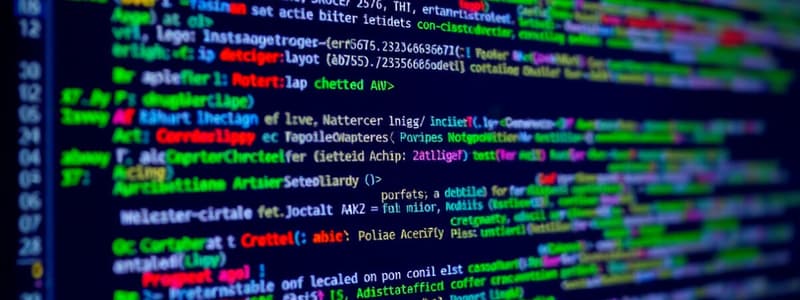Podcast
Questions and Answers
What is the term used for locating and fixing errors in a program?
What is the term used for locating and fixing errors in a program?
- compiling
- debugging (correct)
- linking
- editing
When declaring the variables as shown, what will happen when attempting to compile the code: int else;
When declaring the variables as shown, what will happen when attempting to compile the code: int else;
- both an error and a warning are generated
- no warning or error is generated
- a warning is generated, but the code still compiles
- an error is generated (correct)
Given the code snippet 'int1 = 120; cout', what would be the most likely outcome if the input is 30?
Given the code snippet 'int1 = 120; cout', what would be the most likely outcome if the input is 30?
- the output is 120
- the output is 150
- the program runs without issues but outputs nothing
- a compilation error occurs (correct)
Which of the following actions does NOT occur when a variable conflicts with a reserved keyword in Visual Studio?
Which of the following actions does NOT occur when a variable conflicts with a reserved keyword in Visual Studio?
What aspect of the code 'cout' is critical when it follows 'int1 = 120;'?
What aspect of the code 'cout' is critical when it follows 'int1 = 120;'?
Flashcards
Debugging
Debugging
The process of finding and fixing errors in a program.
Compiling
Compiling
The process of translating human-readable code into machine-readable instructions.
int
int
A reserved keyword in C++, meaning it's a special word with a specific function.
Compiler Error
Compiler Error
Signup and view all the flashcards
Compiler Warning
Compiler Warning
Signup and view all the flashcards
Study Notes
Programming Concepts
- Debugging: Locating and fixing errors in a program.
- Compiling: The process of converting source code into machine-executable code.
- Linking: Combining object files created during compilation to form an executable program.
- Output: The results produced by a program.
- Errors and Warnings: Problems in code that prevent compilation or execution or indicate potential issues.
Code Fragment Analysis (Question 3)
- Variable Declarations: Variables must be declared before use to store values of correct type.
- Conditional Logic (if-else): Uses boolean expressions to determine which block of code to execute.
- Logical Operators:
&&(AND),||(OR),=(equals),>(greater than),<(less than) used in conditional statements. - Input: User input, using
cin, is crucial for the code's functionality. - Output: Printing variables to the console, using
cout, is how the results of a calculation are displayed. - Example: Code fragment evaluates
int1 > 100andint2 = 50. If both are true,int3will be calculated, then printed, otherwiseint3takes the value ofint1.
Code Fragment Analysis (Question 4)
- switch statement: A control flow statement that executes different code blocks based on the value of an expression.
Valid Identifier Names (Question 5)
- Identifiers: Names given to variables, functions, classes, etc.
- Rules to follow:
- Must start with a letter or the underscore character.
- Can be followed by letters, numbers, or underscores.
- Examples:
adb,Ba3are valid.x:23is NOT valid.
Code Selection (Question 6)
- Conditional Statements:
if-elsestatements execute different code blocks based on specific conditions. - Logical Operators (&& vs. ||): The fundamental difference is that
&&(AND) requires both expressions to be true for execution, while||(OR) requires only one to be true.=(equals also should be used to represent equality.)
Code Fragment Analysis (Question 7)
- Conditional Statements: Nested
ifstatement. - Code Evaluation: Given a value for
i, the code determines whether the conditions are met to print different messages.
Data Types (Question 9)
- Char: Stores a single character.
- Data Types: Used for variables to store appropriate data.
Code Segment Results (Question 10)
- Data Types:
int,float,double. - Operators:
cout, for printing the value of a variable./for division, which results in afloatresult if one of the operands is afloat.
Programming Concepts (Question 11, 12, 13, 14)
- Variables: Memory locations that store values.
- Assignment: Changing the value of a variable.
- Keywords: Special words with predefined meanings in a programming language.
- Constants: Variables whose values cannot be changed after initialization.
- Identifiers: Names given to variables, functions, etc., obeying specific rules (e.g., starting with a letter or underscore).
- Syntax: Rules for writing instructions.
- Compiler: Reads and analyses code, translating it to machine-executable code if it complies with the syntax.
- Output statements (cout): Display output to the console.
Code Execution (Question 15, 16, 17, 18)
- Error Handling:
if-elsestatements are often used to prevent unexpected errors when dealing with user inputs and calculations. Runtime errors occur during execution as opposed to compile-time errors, which occur during compilation. - Comparison Operators:
>=,<=,>,<,==used to compare values for conditional logic
Computer Components (Question 19)
- Output Devices: Print messages to the screen.
- Input Devices: Take user input.
- Memory: Holds data to be processed, memory is classified a primary and secondary storage, where primary storage is RAM and secondary storage is long-term storage such as ROM, a hard drive.
Mathematical Operations (Question 20)
- Modulo Operator: The
%operator finds the remainder of a division problem.
Program Development (Question 21)
- Buoyancy: The ability of an object to float in a liquid or gas, determined by the buoyant force and object's weight.
- Program Task: Prompt the user for sphere details and compute if it will float, in this context, it involves prompting for a radius and weight, performing calculations given a formula to determine the object's volume, and checking if the buoyant force exceeds the weight of the object.
Studying That Suits You
Use AI to generate personalized quizzes and flashcards to suit your learning preferences.



